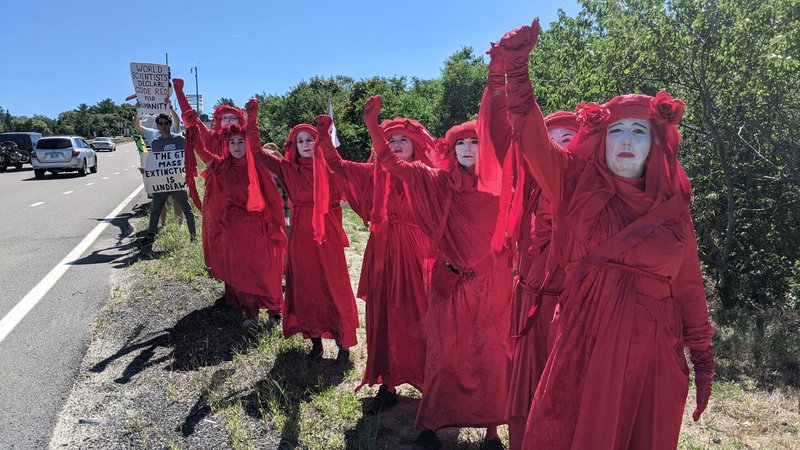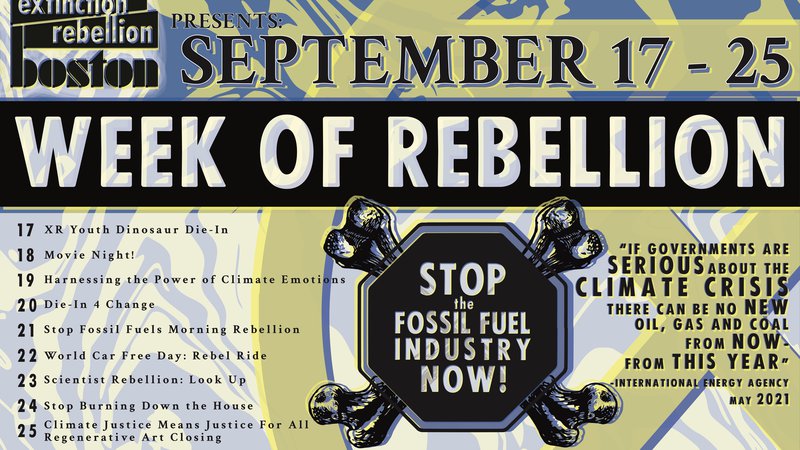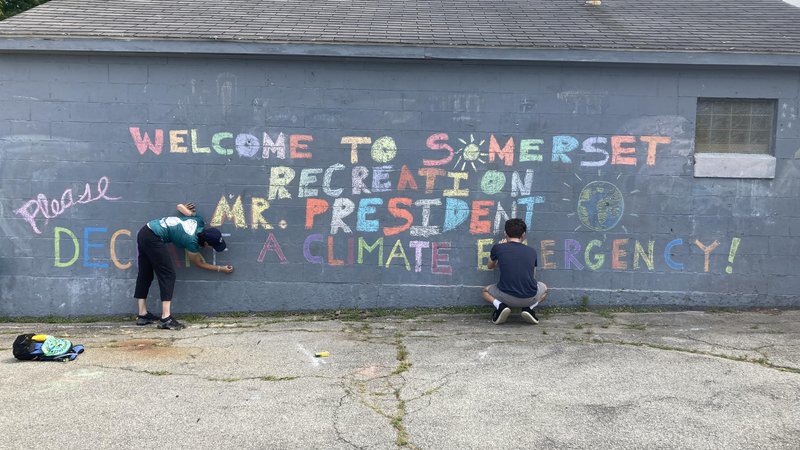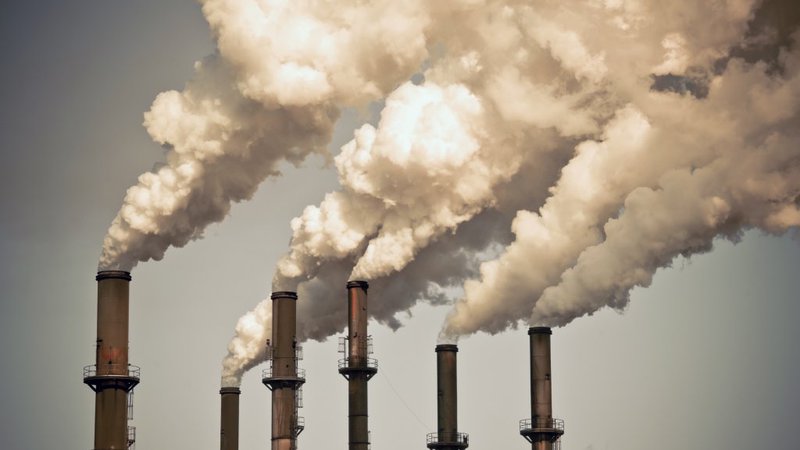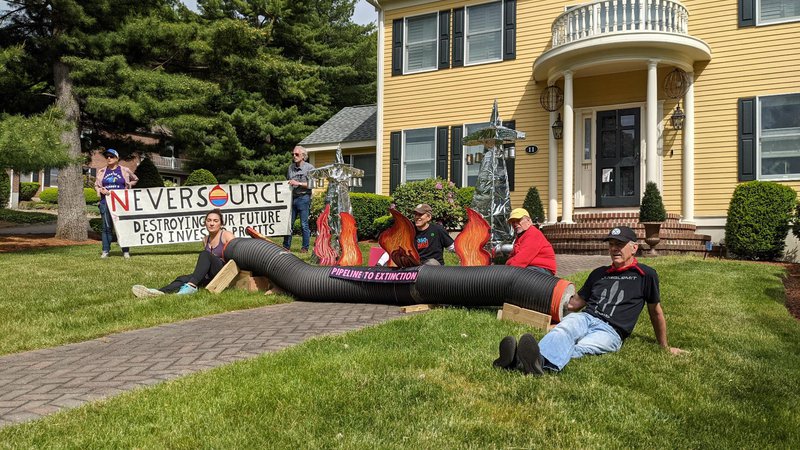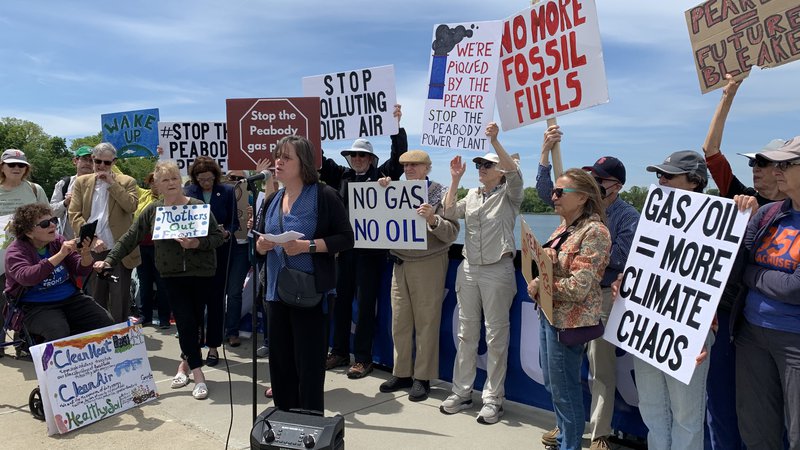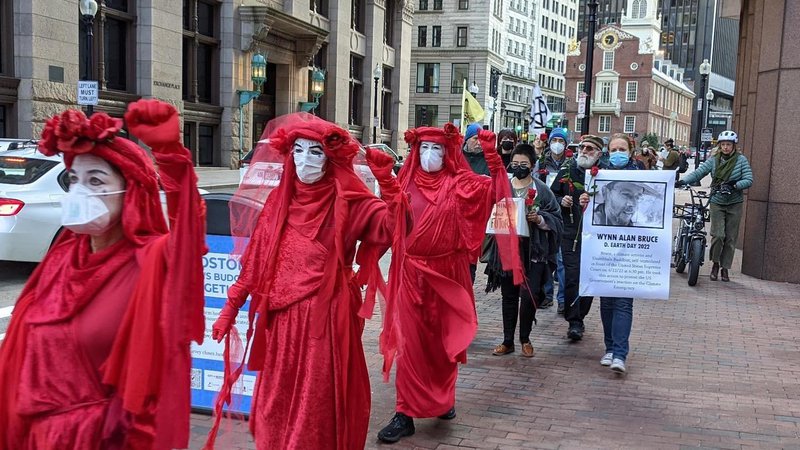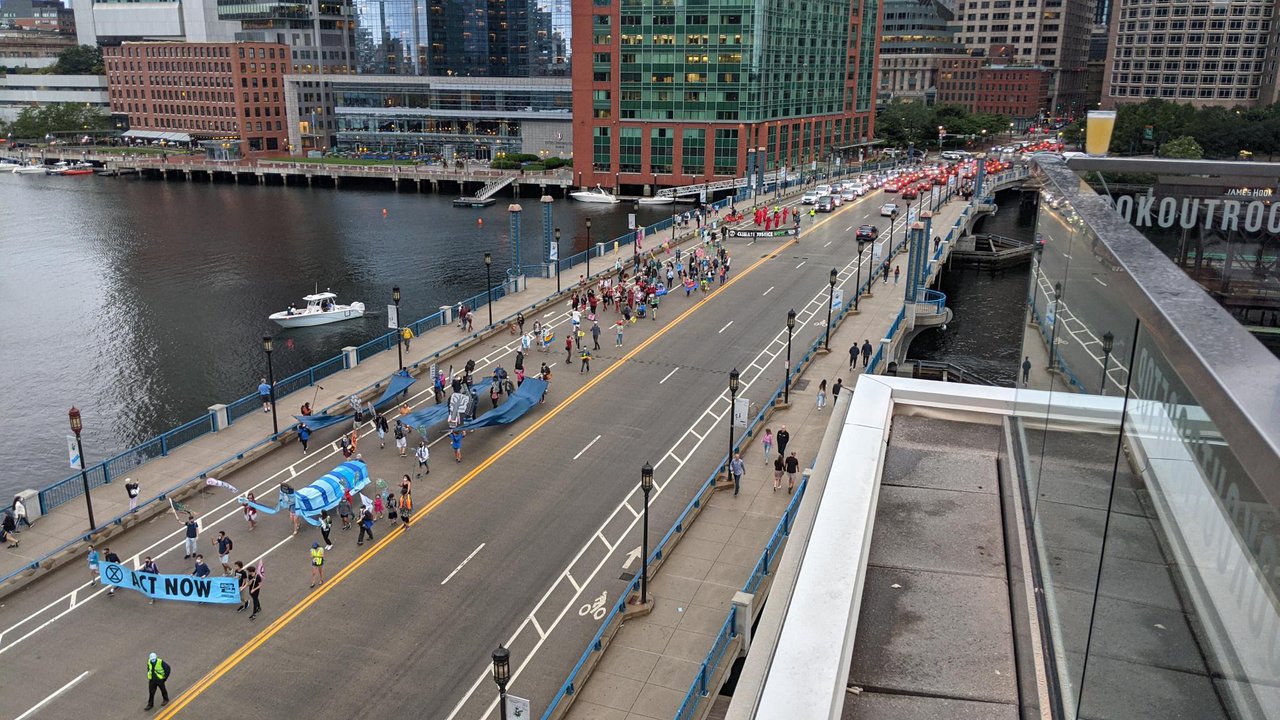
Climate activists disrupt Boston Seaport, demand investment in climate action
Climate Activists Disrupt Boston Seaport, Demand Investment in Climate Action
The Boston Seaport is an unwise investment of our tax dollars. The area will be increasingly prone to flooding as the climate and ecological crises worsen and is an act of climate injustice.
Committing to net zero emissions by 2050 condemns humanity to an unstable and unlivable future as the Climate Crisis and Ecological Collapse accelerate - the Baker administration must act with more urgency.
BOSTON, MA — Climate activist group, Extinction Rebellion Boston, held a disruptive action in the Boston Seaport on Saturday night, hanging two multi-story banners from the rooftops of 'Lookout Bar' and 'Deck 12.' Featuring fanfare and art, they held a parade and rally in the streets of Boston's Seaport District.
The group highlighted that the Boston Seaport faces extreme risk as sea-levels rise from the effects of human-caused climate change. Billions of tax dollars will be wasted on a neighborhood that is prone to flooding from Nor'easters and predicted to be underwater within a few decades. They are calling for climate action by the city of Boston and pointed to the Seaport as an example of climate change denial and wasted, corrupt investment on a plot of land that will soon be underwater.
“The billions of dollars being poured into Boston’s Seaport District is absurd. We are well aware of the risks of the climate crisis and the Seaport District will soon be entirely underwater. Residents of Massachusetts should be angry that the city of Boston is investing in this playground for the wealthy instead of using those billions of dollars to protect Boston and invest in stronger climate action and mitigation. We needed bold action on the climate crisis years ago. We have fallen dangerously behind,” said James Comiskey, 31, of Extinction Rebellion Boston.
The two banners dropped were 30 feet by 30 feet and read “Seaport = $20B of Climate Denial” and “Underwater by 2050. Act Now.” The banners were hung from the rooftops of ‘The Lookout Bar’ at The Envoy Hotel and ‘Deck 12’ at Yotel in the Seaport District. Activists snuck the banners up to the rooftops and tied themselves to the railings as they dropped the banners over the edge. The activists kept the banners hanging for as long as possible, tying their bodies into them so the banners couldn’t be cut down.
While the banners were dropped, activists held a parade and flooded the streets of the Seaport District with music and art. Activists dressed in half-business/half-beach attire, parodying the commutes of business people in the the soon-to-be-underwater district. Three 30-foot pieces of blue fabric with cutouts of people and buildings drowning in the blue “waves” were featured in the parade. The blue fabric trailed behind a massive blue puppet the group named “King Tide," (1) whose head and arms soared 15-feet off the ground. The Massachusetts activist band “Second Line” played as marchers chanted: “News alert; it’s getting hotter! The seaport will be underwater!”
$20 billion of Massachusetts’s tax dollars have been allocated towards building the Seaport neighborhood, referred to by previous Mayor Menino as the “Innovation District.” (2) According to the “Climate Ready Boston Map Explorer,” hosted on Boston’s government website, large portions of the Seaport district will be inundated with coastal flooding as early as 2030, with significant flooding occurring by 2050. (2) By 2030, a single nor’easter could cause up to $1.2 billion of damage in South Boston. (2) By 2070, high tide alone will cover most of the surface area of the Seaport with water. (3) Yet since 2000, 63 development projects have been approved in the South Boston waterfront area. (4) In 2017, the Boston Planning and Development Agency started requiring new development projects to complete a “Climate Resiliency Checklist,” but the checklist only focuses on adapting to sea-level rise (ie access to the building, provisions for emergency water and power during a flooding event) and not prevention efforts. (5)
"Incorporated into our demands is the need for a just transition. The climate crisis disproportionately affects frontline communities here in Massachusetts and around the globe. Black, indigenous, POC, and poor communities will be hit the hardest by the climate crisis even though they have contributed the least to it. We need to use the money allocated to the Seaport to rapidly transition to a clean economy that prioritizes disadvantaged communities and establishes remediation," said Susan Lemont from Extinction Rebellion Boston.
At $153,545, the Seaport district has the highest median household income of any neighborhood in Boston. It is more than double the average household income for the entire city. (6) It's also one of the least diverse neighborhoods in Boston; 83% of the residents are white. (6) Investing in this wealthy neighborhood, instead of using public tax dollars to invest in preventing climate and ecological collapse, is an egregious act of climate injustice and puts corporate profit over people and planet. It’s a gleaming example of climate denial and inaction in favor of the comfort of a small group of privileged residents.
Science and residents of Massachusetts are on the side of climate activists. On August 9, 2021, the Intergovernmental Panel on Climate Change, a body of the United Nations, released a report (7) that detailed five different climate scenarios that are projected to occur based on how quickly we curb global carbon emissions. In all five pathways, the "very likely" temperature range exceeded 1.5°C by mid-century, with the best estimate being that 1.5°C of warming will occur by 2040. (7) Staying below 1.5°C of human-caused warming is considered the 'safe-zone' by climate scientists. Since we have waited so long to act, 1.5°C of warming is expected even if we assume the safest scenario of very low emissions and net negative emissions by mid-century, a scenario far out of reach based on current trends.
The IPCC press release on August 9th says, "...unless there are immediate, rapid and large-scale reductions in greenhouse gas emissions, limiting warming to close to 1.5°C or even 2°C will be beyond reach."(8) Climate scientists unequivocally warn that the effects of the climate crisis become catastrophic to social order and safety once we surpass 1.5°C of warming. The new IPCC report puts the projected temperature range, based on current conditions and emission levels, between 2°C and 4°C by the end of the century.
Because the effects of the climate crisis worsen at higher degrees of warming, and increase our chances of hitting climate tipping points which would trigger unstoppable runaway global heating, scientists reiterate the dire need to limit warming by staying on the safest possible pathway. The public was concerned even before the recent IPCC report. In a statewide poll released in 2020, 69 percent of Massachusetts residents say that Massachusetts needs to change its climate policy and 79 percent say that climate change will be a serious problem if left unaddressed.(9)
Extinction Rebellion is an international climate movement that utilizes nonviolent civil disobedience and protest tactics to compel government action in order to avert climate and ecological breakdown. The group calls for a rapid transition away from an energy system reliant on fossil fuels to renewable, zero emission, sources of energy. They demand that the governments and media around the globe tell the scientific truth to the people, with both urgency and frequency. Because the group criticizes the government’s “criminal inaction on the climate crisis” and distrusts them to transition away from fossil fuels with enough urgency, they demand that the public be included in the process via Citizen’s Assemblies, a randomly selected body of citizens that would deliberate and decide on important issues that have been effectively utilized in other parts of the world.
- King Tide Causes Street Flooding in Boston, Surrounding Areas – NBC Boston
- The Seaport Cost Billions To Build. What Will It Take To Save It? | WBUR News
- City of Boston,“Climate Ready Boston Map Explorer”
- Boston Development & Planning Agency. “Development Projects”
- Boston Planning & Development Agency, “Climate Resiliency Guidance”
- Boston Planning & Development Agency, “Boston in Context: Neighborhoods”
- IPCC, 2021: Summary for Policymakers, "In: Climate Change 2021: The Physical Science Basis. Contribution of Working Group I to the Sixth Assessment Report of the Intergovernmental Panel on Climate Change."
- Intergovernmental Panel on Climate Change, "IPCC Press Release"
- Statehouse News Service, "Poll Tested Public Opinion on Climate Change." Katie Lannon. 2020
Related Stories:
Featured:
-
The third annual Week of Rebellion is full of opportunities for celebration and action!
-
Our government had the opportunity to finally turn our state into a "climate leader," and they decided yet again to prioritize profits and political posturing over the well-being of residents.
-
Prominent climate scientists and activists demand immediate climate action in the United States.
-
Stop the Fossil Fuel Industry, Now: List of events for Extinction Rebellion Boston's September week of rebellion
-
A compilation of books, movies, articles, and ways to take action to protect Black lives
-
Nadia Colburn, PhD and member of Extinction Rebellion Media team, discusses how to talk about the climate and ecological crisis with family and friends.
Upcoming Events:
-
Sat Feb 28th @ 10 a.m.
-
Sat Feb 28th @ noon
-
Sat Feb 28th @ 2:30 p.m.
